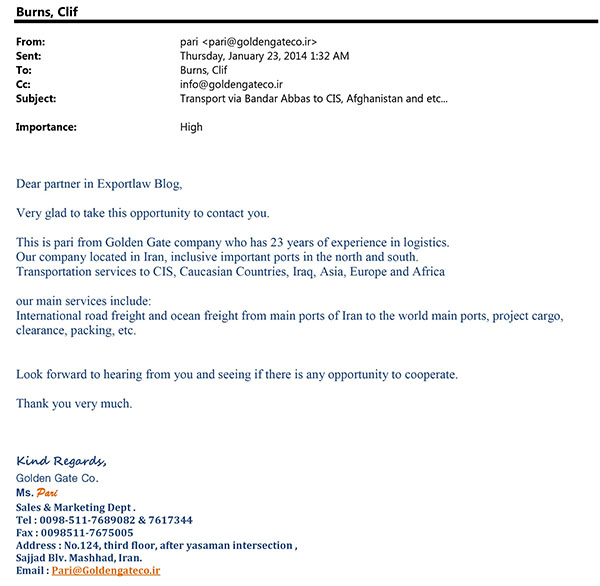![By Alireza Javaheri (http://www.panoramio.com/photo/50249960) [CC-BY-3.0 (http://creativecommons.org/licenses/by/3.0)], via Wikimedia Commons http://commons.wikimedia.org/wiki/File%3ATehran_-_Azadi_Tower.jpg By Alireza Javaheri (http://www.panoramio.com/photo/50249960) [CC-BY-3.0 (http://creativecommons.org/licenses/by/3.0)], via Wikimedia Commons http://commons.wikimedia.org/wiki/File%3ATehran_-_Azadi_Tower.jpg](https://www.exportlawblog.com/images/azad_tower.jpg) Last week, the Office of Foreign Assets Control issued General License D-1 relating to provision of personal communications software, services and hardware to Iran. Â This general license amends and replaces, as of February 7, 2014, General License D on the same subject. The following changes are made by the amendment
Last week, the Office of Foreign Assets Control issued General License D-1 relating to provision of personal communications software, services and hardware to Iran. Â This general license amends and replaces, as of February 7, 2014, General License D on the same subject. The following changes are made by the amendment
- The amended license now permits exports of covered software, services and hardware by non-U.S. persons to Iran.
- Additionally, hardware and software that is not subject to the EAR, because it is located outside the United States or otherwise, can be exported to Iran by U.S. and foreign persons.
- The amendment also cleans up an embarrassing drafting error. General License D permit exports to “persons in Iran” rather than “to Iran,” meaning that it did not authorize persons traveling to Iran to carry covered hardware and software with them for personal use when traveling to Iran. General License D-1 makes clear that exports are authorized “to Iran” and that this covers travelers to Iran.
- Exports of publicly available, no-cost services and software to the Iranian Government are now authorized.
- A footnote makes clear that payments can involve indirect dealings with Iranian financial institutions blocked only under Executive Order 13599 (as opposed to Iranian banks like Bank Saderat and Bank Melli that are sanctioned under terrorism and WMD sanctions).
The FAQs on General License D-1 provide some insight into why this General License, rather unusually, permits dealings with the Government of Iran. They note that the authorization includes the Government of Iran “to further ensure that the sanctions on Iran do not have an unintended chilling effect” on companies seeking to make available publicly available, no-cost personal communications tools to persons in Iran. What this means, I think, is that when no-cost software or services are at issue, it is impossible for the provider to tell whether the recipient is an Iranian government official or not. This exception is limited to no-cost software and services presumably because when payment is required the provider will at least have a name of the supposed end-user of the software and services. Even then, it’s not clear how a company providing fee-based personal communications software to, say, Edward Casaubon in Tehran can tell whether Mr. Casaubon is an Iranian government official or simply a tiresome and frustrated author bearing an uncanny resemblance to John Locke.

 Posted by
Posted by  Category:
Category: 

![Nitrotough Gloves http://www.marigoldindustrial.com/upload/img/nitrotoughN230B_web_situation_205x205.jpg [Fair Use] Nitrotough Gloves http://www.marigoldindustrial.com/upload/img/nitrotoughN230B_web_situation_205x205.jpg [Fair Use]](https://www.exportlawblog.com/images/nitrotough_gloves.jpg) New Jersey based
New Jersey based ![By Jean-Pierre Bazard Jpbazard (Own work) [GFDL (http://www.gnu.org/copyleft/fdl.html) or CC-BY-SA-3.0-2.5-2.0-1.0 (http://creativecommons.org/licenses/by-sa/3.0)], via Wikimedia Commons http://commons.wikimedia.org/wiki/File%3ALe_navire_cargo_%E2%80%98%E2%80%99Iran_Sadr%E2%80%98%E2%80%99_(6).jpg By Jean-Pierre Bazard Jpbazard (Own work) [GFDL (http://www.gnu.org/copyleft/fdl.html) or CC-BY-SA-3.0-2.5-2.0-1.0 (http://creativecommons.org/licenses/by-sa/3.0)], via Wikimedia Commons http://commons.wikimedia.org/wiki/File%3ALe_navire_cargo_%E2%80%98%E2%80%99Iran_Sadr%E2%80%98%E2%80%99_(6).jpg](https://www.exportlawblog.com/images/iran boat.jpg)

![Pouya Airlines IL 76 at Antalya Airport via https://www.facebook.com/media/set/?set=a.546519808709147.135602.240207326007065&type=1 [Fair Use] Pouya Airlines IL 76 at Antalya Airport via https://www.facebook.com/media/set/?set=a.546519808709147.135602.240207326007065&type=1 [Fair Use]](https://www.exportlawblog.com/images/il76 at Antalya Airport.jpg) We’ve all heard the story of exuberant youngsters who find their career hopes dashed because they posted on Facebook pictures of themselves half-clothed and glassy-eyed with a margarita in one hand and a bong in the other. It’s a cautionary tale, for sure, and has certainly meant that many people have realized that they perhaps should confine pictures of their latest bacchanalian orgy to a more discrete mode of distribution among friends than Facebook. If you wouldn’t send it to your grandmother, don’t post it on your Facebook page, right?
We’ve all heard the story of exuberant youngsters who find their career hopes dashed because they posted on Facebook pictures of themselves half-clothed and glassy-eyed with a margarita in one hand and a bong in the other. It’s a cautionary tale, for sure, and has certainly meant that many people have realized that they perhaps should confine pictures of their latest bacchanalian orgy to a more discrete mode of distribution among friends than Facebook. If you wouldn’t send it to your grandmother, don’t post it on your Facebook page, right?

